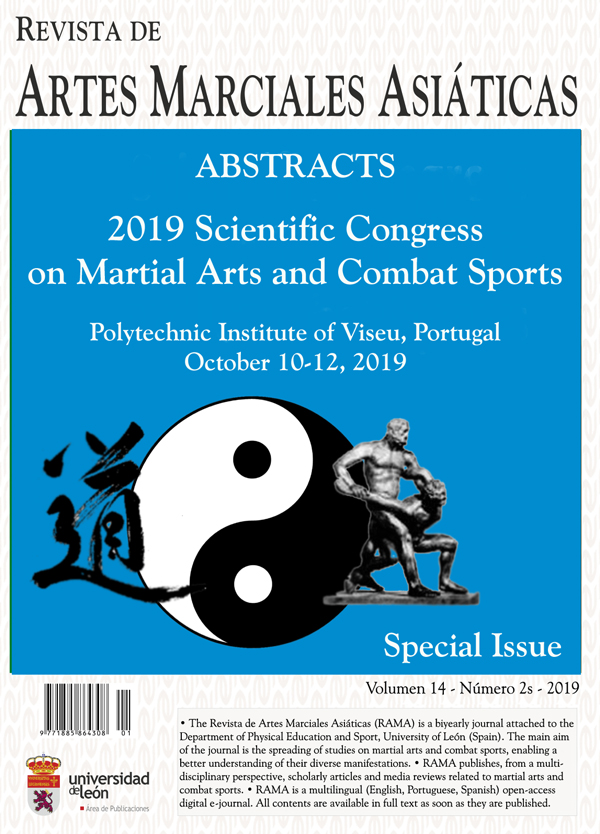Research progress of restraining campus bullying by martial arts training
DOI:
https://doi.org/10.18002/rama.v14i2s.6004Palavras-chave:
Martial arts, combat sports, martial arts training, bullying, violence preventionResumo
This narrative review analyzed the existing research related to the practice of martial arts and campus bullying. This literature suggests that martial arts training can reduce bullying behaviors by improving individual self-control and self-esteem, reducing hostility and strengthening interpersonal communicative ability. Current research also emphasizes the efficacy of those martial arts activities that pay attention to participants’ moral education or norms of proper social behavior in order to improve physical cognition and lead to restraining individual bullying behavior. Future research should focus on cross-cultural factors and local situations, combine quantitative and qualitative research methods, and explore the internal mechanism of martial arts training to curb campus bullying, so as to explore new ways in which martial activity can promote individual psychological adjustment and to positively address problem behavior.
Downloads
Métricas alternativas
Referências
Bandura, A. (1973). Aggression: A social learning analysis. American Journal of Sociology, 26(5), 1101-1109. doi: URLhttps://doi.org/10.2307/1227918
Fung, A. L. C., Lee, T. K. H. (2018). Effectiveness of chinese martial arts and philosophy to reduce reactive and proactive aggression in schoolchildren. Journal of Developmental & Behavioral Pediatrics, 39(5), 404-414. doi: URLhttps://doi.org/10.1097/DBP.0000000000000565
Fabio, R. A., Towey, G. E. (2018). Cognitive and personality factors in the regular practice of martial arts. The Journal of sports medicine and physical fitness, 58(6), 933-943. doi: URL10.23736/S0022-4707.17.07245-0
Liu, C. P. (2007). The argumentum of the development of wushu in home and abroad. Journal of Jilin Institute of Physical Education, 23(6), 161-162.
Masilo, D. T. (2018). Social work intervention to address the phenomenon of bullying amongst learners in the school setting: A literature review. South African Journal of Education, 38(1), 1-9. doi: URLhttps://doi.org/10.15700/saje.v38ns1a1594
North, T. C., McCullagh, P., &Tran Z. V. (1990). Effect of exercise on depression. Exercise & Sport Sciences Reviews, 18(1), 379-416. doi: URLhttps://doi.org/10.1249/00003677-199001000-00016
Qiao, Y. J., Xing, Y., Ji, C. Y., & Zhang, L. (2009). The prevalence of bullying behaviors among urban middle school students in 18 provinces, china. Chinese Journal of Epidemiology, 30(5), 444-447. doi: URLhttps://doi.org/10.3760/cma.j.issn.0254-6450.2009.05.007
White, B. A., Turner, K. A. (2014). Anger rumination and effortful control: mediation effects on reactive but not proactive aggression. Personality and Individual Differences, 56,186-189. doi: URLhttps://doi.org/10.1016/j.paid.2013.08.012
Downloads
Publicado
Como Citar
Edição
Secção
Licença
Direitos de Autor (c) 2019 Guodong Zhang

Este trabalho encontra-se publicado com a Licença Internacional Creative Commons Atribuição-NãoComercial-CompartilhaIgual 4.0.
Os autores que publicam nesta Revista estão de acordo com os seguintes termos:
- Os autores cedem, de forma exclusiva, os direitos de exploração (reprodução, distribuição, comunicação pública, transformação) à Universidade de Léon, podendo estabelecer, em separado, acordos adicionais para a distribuição não exclusiva da versão do artigo publicado na Revista (por exemplo: alojar no repertório institucional ou publicá-lo num livro), com o reconhecimento da publicação inicial nesta Revista.
- O trabalho encontra-se na Creative Commons Attribution-Non Commercial-Share Alike 4.0 International License. Pode-se consultar aqui o resumo e o texto legal da licença.
- Permite-se, e sugere-se, que os autores difundam electronicamente as versões pré-impressão (versão antes de ser avaliada) e pós-impressão (versão avaliada e aceite para publicação das suas obras antes da sua publicação), favorecendo a sua circulação e difusão, e com ela o possível aumento da sua citação e alcance pela comunidade académica.











